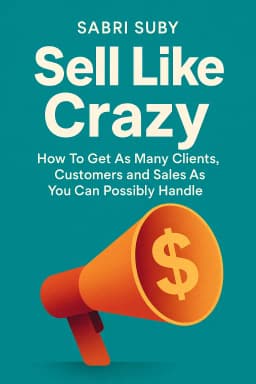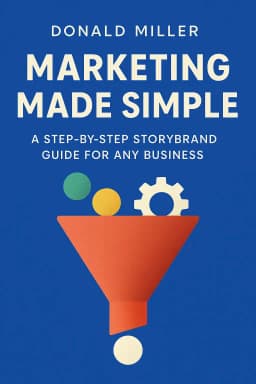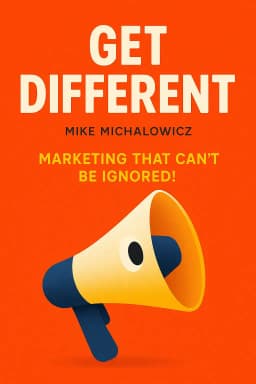
Stop Selling, Start Solving
The Essential Handbook for Prospecting and New Business Development
Golden Hook & Introduction
SECTION
Olivia: Alright Jackson, ‘New Sales. Simplified.’ What's your one-sentence, brutally honest review? Jackson: It's the book that looks you in the eye and says, 'Stop blaming the economy. The problem is probably you... but here's how to fix it.' It's like a tough-love intervention for your sales pipeline. Olivia: That is a perfect summary! And that's exactly the vibe from author Mike Weinberg. Today we're diving into his classic, New Sales. Simplified.: The Essential Handbook for Prospecting and New Business Development. Jackson: And this isn't just some random guy. Weinberg's been named a top sales expert to follow, and this book is consistently ranked as one of the best sales books of all time by places like HubSpot. It’s got serious street cred. Olivia: Exactly. And he wrote it from a place of deep frustration. He saw a huge skills gap in the market: salespeople who were great at managing existing accounts but were terrified of "hunting" for new ones. He argues that years of economic boom created a generation of passive 'farmers' instead of proactive 'hunters.' Jackson: That makes so much sense. It's easy to be a great salesperson when customers are lining up at your door. But what happens when you have to go out and find them? Olivia: That's the million-dollar question. And it leads us straight into his first, and maybe most uncomfortable, big idea: the real reasons salespeople fail.
The Blunt Truth: Why Salespeople (and Companies) Fail
SECTION
Jackson: Oh boy, I have a feeling this is going to be like looking in a very unflattering mirror. Olivia: It is. Weinberg lays out what he calls the "Not-So-Sweet 16" reasons salespeople fail at new business. And they are painfully specific. For example, number three is being a "Prisoner of Hope." Jackson: A prisoner of hope? I think that's my middle name. That’s when you have one or two big deals in your pipeline, and you just keep refreshing your email, praying they’ll close, while you completely stop looking for new leads. Olivia: You've nailed it. Or how about number twelve: "Being too busy being a good corporate citizen." This is the person who volunteers for every internal committee, plans the office party, and is an expert on the new HR software, but their sales numbers are in the tank. Jackson: Ouch. That 'good corporate citizen' one hits close to home. I love a good committee meeting! It feels productive, even when it's not. But wait, is it always the salesperson's fault? Weinberg doesn't think so, right? Olivia: Not at all. And this is where the book gets really interesting. He dedicates a whole chapter to the company's responsibility. He argues that sometimes, the organization itself is the biggest obstacle. Jackson: How so? Olivia: He tells this incredible story from when he was a chief sales executive for a $90 million distributor. To save costs, he also had to act as the sales manager for one division. The president of that division had a very low view of sales. To him, salespeople were just a necessary evil. Jackson: I feel like a lot of people in other departments secretly think that. Olivia: Well, it had real consequences. On his second day, the author gets a call on his personal cell phone from an angry customer with a highly technical product issue. He’s baffled. How did this guy get his number? He investigates and finds out that the customer service reps were instructed to forward all problems—technical, billing, anything—to the sales manager's desk. His desk had literally become the company's garbage dump. Jackson: Whoa. So he's supposed to be out there hunting for new business, but he's stuck dealing with yesterday's problems because the company culture sees 'sales' as the catch-all for anything unpleasant. Olivia: Precisely. He couldn't focus on generating new revenue because he was drowning in service work. This is Weinberg's critique of the "hybrid hunter-farmer" role. When you force one person to do both—hunt for new business and farm existing accounts—the urgent will always kill the important. Farming, or customer service, always feels more urgent. Jackson: That makes perfect sense. Answering an email from a current, slightly unhappy client feels way more pressing than making 50 cold calls to people who might not even answer. Olivia: Exactly. And the company sets up that conflict. He also points to illogical compensation plans that don't reward new business, a lack of clear strategy from the CEO, and a culture of micromanagement. It's a powerful message: you can't just blame the sales team if the whole system is designed to make them fail. Jackson: Okay, but a lot of companies do combine sales and service. Is that always a bad thing? Olivia: Weinberg's point is more nuanced. It’s not that it’s always bad, but it’s almost always detrimental to new business development. If your primary goal is growth and acquiring new logos, you can't saddle your hunters with heavy farming duties. You have to create an environment where they can actually hunt. Jackson: So, step one is to clear out all the corporate sludge and internal roadblocks that are holding you back. Olivia: Yes. And once you've done that, Weinberg says you need to arm yourself. And your most important weapon is something most people get completely wrong: the sales story.
The Ultimate Weapon: Crafting a Killer Sales Story
SECTION
Jackson: A sales story. Honestly, that sounds a bit like corporate jargon. Is it just a fancier way of saying 'elevator pitch'? Olivia: It can be, but most people do it wrong. Weinberg’s most powerful and counterintuitive point is this: your sales story is not about you. It's not about your company's founding date, your impressive list of clients, or your world-class process. Jackson: Hold on. Then what is it about? Olivia: It's about the customer's problems. He quotes the founder of Revlon, who famously said, "We don't sell cosmetics, we sell hope." Your story has to be about the hope, the solution, the better future you can provide. Jackson: I can see how that would be more engaging. No one wants to hear you brag about your company for ten minutes. Olivia: Exactly. And to show what not to do, he shares this hilariously painful example. He received an email from a salesperson at a new company. The email was a long, self-focused monologue about their "fulfillment, customer service, distribution, and returns management experience." It even included a link to a comprehensive flowchart with microscopic print detailing their "world-class process." Jackson: Oh, the flowchart. That's a classic. It screams "I am very serious and you should be very impressed, and also very bored." Olivia: (laughing) Precisely. The author's reaction was, "So what?" Who cares about your process? What problems do you solve for me? That email failed the "So What?" test spectacularly. Jackson: Okay, so what does a good story sound like? How do you build one without it sounding like a marketing brochure? Olivia: He provides a brilliant framework he calls the "Power Statement." It's a simple, three-part structure, and the order is absolutely critical. First, you lead with the Client Issues. You talk about the pains, problems, and frustrations your target customers typically face. Jackson: So you start by showing you understand their world. Olivia: Exactly. You earn the right to be heard. Only then do you move to part two: your Offerings. This is where you briefly state what you actually do or sell. And finally, part three is your Differentiators. What makes you different and, more importantly, better than the alternatives? Jackson: Client Issues, Offerings, Differentiators. In that order. That feels so much more logical. You're leading with their pain, not your product. Olivia: And it works. He tells the story of a Canadian security company, Allsafe Security. Their sales team was made up of former security guards who had been promoted. They were great people, but they were getting crushed on price by competitors and were totally demoralized. They didn't know how to articulate their value. Jackson: So they were just saying, "We offer security services," and the client was saying, "Okay, this other company offers them for 10% less." Olivia: Exactly. So Weinberg's team worked with them to build a Power Statement. Instead of leading with "We sell security guards," they started leading with the client issues. They'd say things like, "Many property managers we work with are frustrated with the constant turnover of security staff, the lack of professionalism, and the fear that their guards are asleep on the job. They worry about liability and their building's reputation." Jackson: Wow. If you're a property manager, that's going to get your attention immediately. You're speaking my language. Olivia: That's the key. After outlining those pains, they would then briefly mention their offerings—highly-trained security professionals—and their differentiators, like their rigorous training academy and low turnover rate. It completely changed the conversation from price to value. The team's confidence soared, and their sales results were incredible. They went from being victims to being experts. Jackson: That's a powerful shift. It’s not just a pitch; it’s a diagnosis. You're showing them you understand the disease before you offer the cure. Olivia: That's a perfect way to put it. The story becomes a diagnostic tool. Jackson: Alright, so we've diagnosed the problem, we've forged our weapon—this killer sales story. Now what? How do we actually go on the attack?
The New Sales Driver: A Simple Framework for Attack
SECTION
Olivia: This is where Weinberg brings it all home with his "New Sales Driver" framework. And true to the book's title, it is beautifully simple. It has just three parts. Jackson: I'm ready. I like simple. Olivia: Part one: Select Targets. Be strategic. Don't just randomly call people. Create a finite, focused, written, and workable list of ideal prospects. Know who you're going after and why. Jackson: So it's like a military campaign. First, pick your battles. Don't just wander onto the battlefield. Olivia: A perfect analogy. Part two: Create and Deploy Weapons. This is what we just talked about—your sales story is your primary weapon, but it also includes your phone skills, your email templates, your case studies. Get your arsenal in order. Jackson: Right. Make sure your troops have guns and know how to use them. Olivia: And part three, which he says is the most important because it's an action: Plan and Execute the Attack. This is where most people fail. They have a list, they have a story, but they never actually pull the trigger. Jackson: Because life gets in the way. The emails pile up, the "good corporate citizen" meetings call your name... Olivia: Exactly. He has a great line from Jerry Seinfeld about car rentals. Seinfeld says, "You know how to take the reservation, you just don’t know how to hold the reservation. And that’s really the most important part." Weinberg says it's the same with prospecting. Anyone can write "prospecting time" in their calendar. The hard part is holding that reservation against all the other distractions. Jackson: So how do you do it? How do you hold the reservation? Olivia: His main tool is aggressive Time Blocking. You schedule non-negotiable, 90-minute blocks in your calendar for proactive outreach. You treat that appointment with the same respect you'd give a meeting with your CEO. It is sacred time. Jackson: That requires a ton of discipline. Olivia: It does. And it requires a certain mindset. He tells this great story about his love for Southwest Airlines. Back when he was a traveling salesperson, he realized that other airlines punished you for planning ahead. If you booked a flight and the meeting got moved, you'd get hit with a huge change fee. Jackson: Oh, the dreaded change fee. The bane of every business traveler's existence. Olivia: But Southwest had no change fees. This was a game-changer. It allowed him to be aggressive and proactive. He would book flights to a target city before he had even secured the meetings. He called it his "Sales Force One." Just booking the flight created a commitment. It forced him to fill that trip with valuable meetings. It was a way of executing the attack. Jackson: That's a bold move. It's putting your money where your mouth is. You're so committed to attacking that city that you've already bought the plane ticket. I love that. It turns planning from a passive activity into a forward-moving, aggressive action. Olivia: It's the physical manifestation of "executing the attack." You're not waiting for permission or for the perfect moment. You're creating the moment yourself.
Synthesis & Takeaways
SECTION
Olivia: And really, that story sums up the entire book. It all comes back to this: sales isn't complicated, it's just hard. It requires shedding the excuses, focusing your message on the other person's problems, and then having the discipline to execute a simple plan, relentlessly. Jackson: And it's about taking ownership. Weinberg's message is that you can't wait for marketing to save you or for the perfect conditions to magically appear. You have to be the one to drive the sale. You are the new sales driver. Olivia: Beautifully put. There is no magic bullet. The magic is in doing the basics, but doing them with excellence and consistency. It's about having a plan and, most importantly, executing it. Jackson: It’s a call to action, not a book of secrets. It’s telling you to stop looking for shortcuts and start putting in the work, but in a smarter, more focused way. Olivia: So for everyone listening, here’s a challenge for this week, straight from the book: Block out two 90-minute 'prospecting' appointments in your calendar. Label them "MONEY" if you have to. Treat them like a meeting with your most important client. Don't cancel them. Don't move them. Jackson: And let us know how it goes. We're curious to hear if you can hold the reservation. Find us on our socials and share your experience. We'd love to hear if this simple change makes a difference. Olivia: This is Aibrary, signing off.









